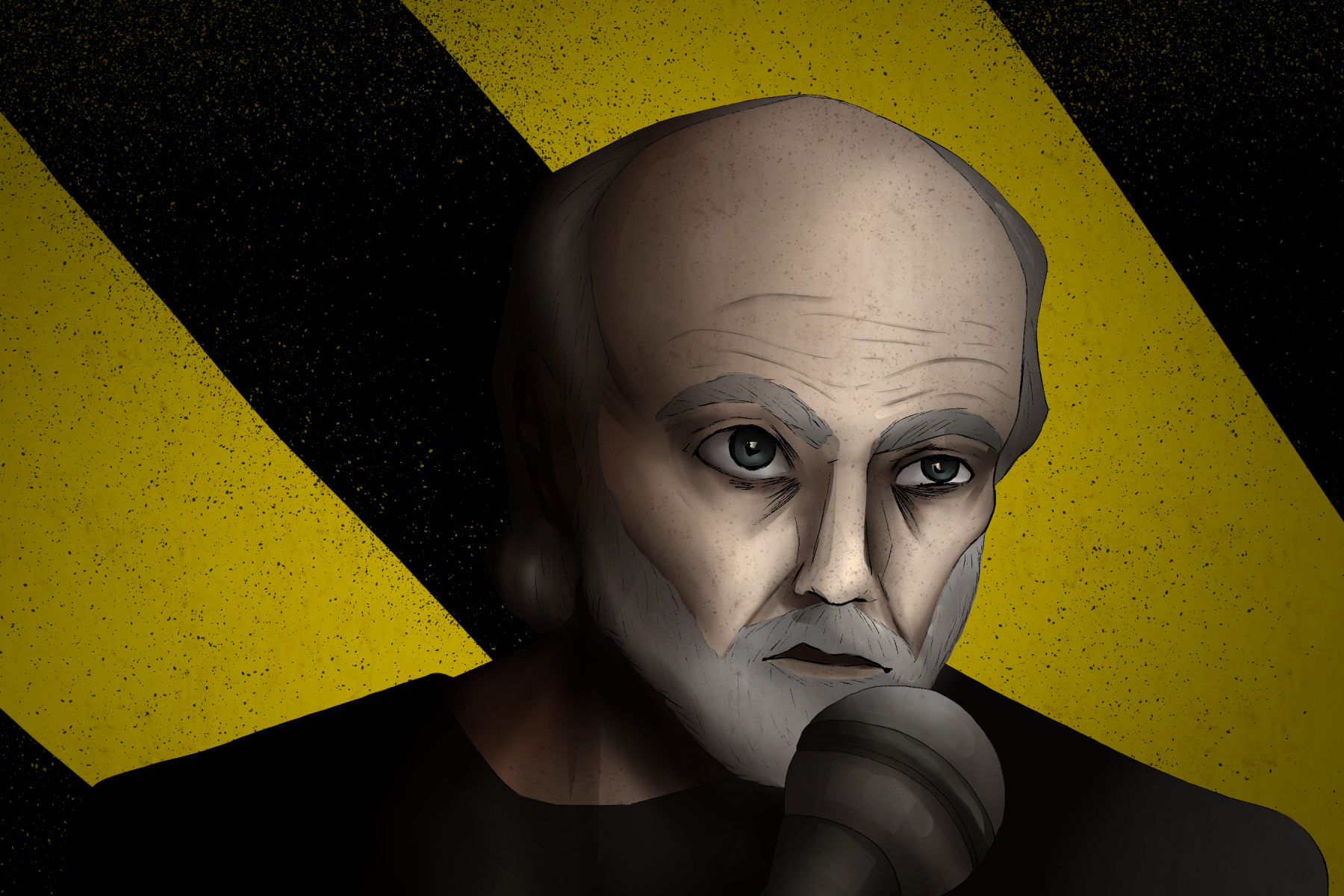George Carlin is often (and rightfully) regarded as one of the greatest comedians of all time, ranked alongside comedy legends like Richard Pryor, Lenny Bruce and Joan Rivers. His career, which began in the 1960s and lasted until his death in 2008, produced 13 well-rated stand-up specials and 19 comedy albums.
Carlin exhibited an eccentric, countercultural style that was all his own. During a time when comedians were expected to look professional and clean-shaven, he dressed casually and sported long, untidy hair. Carlin enjoyed going against the grain, and spent much of his career rejecting American societal norms.
He was quick-witted, foul-mouthed, energetic and misanthropic. His comedy managed to be crass yet educational, vulgar yet enlightening. His humor doubled as social commentary, highlighting aspects of American society and human nature that remain as flawed today as they were back then.
Newcomers to Carlin’s stand-up may find his style somewhat jarring. He behaves more like a philosopher than a comedian; instead of setting up a joke with a punchline, Carlin rants about an observable truth … and everybody laughs. We are the joke. Of course, his stand-up specials are entertaining, but they also provide an opportunity for self-reflection and growth.
Below are just a few examples of George Carlin’s iconic social commentary (or should we call it “social comedy”), all of which are exceedingly relevant in 2023.
Materialism
Carlin regularly poked fun at consumer culture, a loosely thrown-around term used to describe societies that overvalue money and material possessions. Carlin brilliantly addressed this topic in 1986 when he spent five minutes evaluating the American obsession with “stuff.”
“That’s all your house is. It’s a place to keep your stuff while you go out and get more stuff,” he said.
According to Carlin, the desire for “stuff” is a driving force in life, but also overcomplicates it. He explains that people buy bigger houses because they have “too much stuff”; they might even pay storage companies to look after some of their “stuff.” There’s also the threat of burglars who attempt to steal “good stuff.”
Carlin’s repetition of the word “stuff” emphasizes the absurdity of consumer culture; everybody is preoccupied with obtaining tangible items in order to feel secure and accomplished. His comedic analysis of this obsession boils an academic topic down to its most basic roots.
By doing this, Carlin allows his audience to view their society through a different lens. While it likely won’t deter them from purchasing unnecessary commodities, it might encourage them to self-reflect.
Technology
“Everywhere you go now, there’s some putz with a camcorder, and he is going to tape everything,” said Carlin in his 1996 special, “Back in Town.”
It’s unfortunate he didn’t live long enough to witness the mass proliferation of cell phones. He would have written a wealth of material about it. However, his commentary about camcorders easily applies to the smartphones of today.
“Doesn’t anyone in this country just stop and look at things anymore? Sort of take them in? Maybe even remember them?”
Due to social media, people’s obsession with filming every experience has only increased. They are often so preoccupied with chronicling a particular moment that they end up missing it altogether. Carlin once again points out the hilarious absurdity of this endeavor, highlighting the illogic behind it.
“Are peoples’ lives so bankrupt they sit at home looking at things they already did?”
And he said that in 1996! Talk about being ahead of the curve.
Abortion
The debate between pro-life and pro-choice has persisted in the United States for several decades. In “Back in Town” Carlin takes a definitive stance when he claims that the pro-life movement is actually “anti-woman.”
He opened up his 1996 special with a fiery 12-minute rant that targeted different groups who opposed abortion. Conservatives, he said, are only concerned with the unborn, citing their reluctance to fund certain educational programs.
The Catholic Church, which strictly prohibits abortion, also received scorn from Carlin.
“When some of these cardinals and bishops have experienced their first pregnancies and their first labor pains and they’ve raised a couple of children on minimum wage, then I’ll be glad to hear what they have to say about abortion,” announced Carlin to a cheering audience.
He also went on a brief tangent in which he defended the gay community.
“That’s another thing that confuses me. Catholics are against abortions, and they’re against homosexuals. Well … who has less abortions than homosexuals? Leave these people alone.”
Language and Government
Carlin frequently ruminated on what he referred to as the “softening of language.” This, he claimed, was a process that concealed the truth. In his 1990 special, “Doin it Again,” he rapidly listed a number of examples.
“The CIA doesn’t kill anybody anymore. They ‘neutralize’ them,” said Carlin, “The government doesn’t lie. It ‘engages in misinformation.’ The Pentagon actually measures nuclear radiation in something they call ‘sunshine units.’”
Language is purposeful. Every word spoken by a politician, advertiser, minister or activist is deliberately selected to convey a particular narrative.
Consider the news cycle in the past few years. When supporters of then-President Donald Trump stormed the Capitol on Jan. 6, 2021, some journalists called it an “insurrection” while others labeled it a “mostly peaceful protest.” Both sides employed deliberate wording to portray the same event differently.
“Government wants to control information and control language because that’s how you control thought,” said Carlin.
It’s an eerie, Orwellian claim but not a wholly inaccurate one. According to a PEW Research Center report in 2022, only two-in-ten Americans cite their trust in the federal government.
Carlin would likely want those numbers driven down even further.
An Irreverent Legacy
There are plenty of other exceptional George Carlin jokes that still ring true today. However, at the risk of ruining too many punchlines, I recommend you watch him for yourself. His crass, profanity-filled comedy might take some getting used to, but the timeless lessons in each special are well worth it.
To conclude, here’s one final George Carlin joke that’s just, well, funny.
“Undisputed heavyweight champion? Well, if it’s undisputed … what’s all the fighting about?”

















